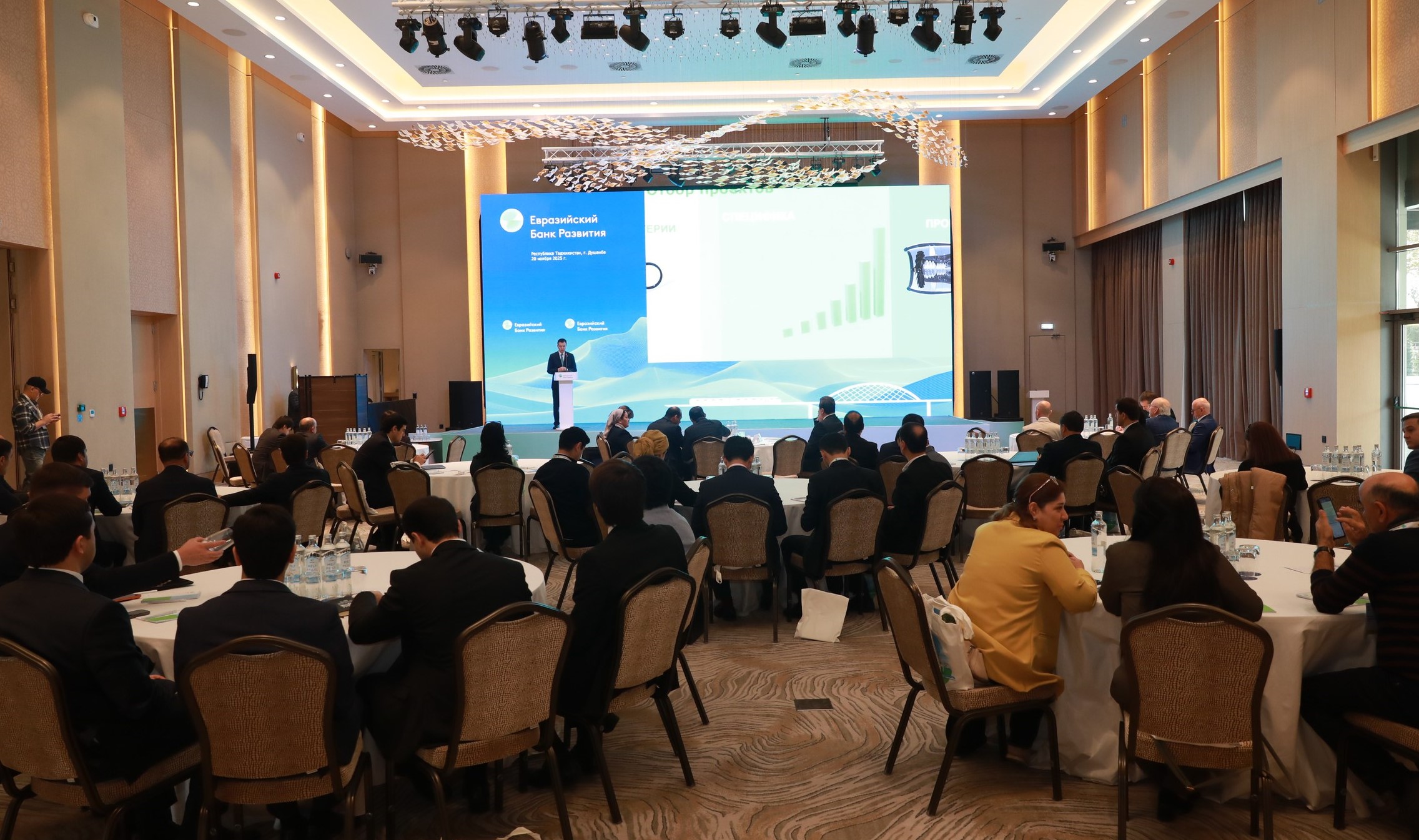The EDB holds a presentation in Dushanbe and signs agreements on six new projects to support Tajikistan’s development
Dushanbe, 20 November 2025
The Eurasian Development Bank (EDB) held a presentation in Dushanbe where it signed cooperation documents with Tajikistan’s government bodies and companies. The event provided a platform for strengthening strategic partnerships and discussing new areas of cooperation.
In his welcoming speech, Yusuf Majidi, First Deputy Minister of Finance of Tajikistan, emphasised the importance of cooperation with the EDB for the country’s sustainable development.
“The EDB has a wide range of financial instruments, modern approaches and a high level of expertise. In the face of global challenges, multilateral development banks play a particularly important role in providing long-term financing, supporting reforms and developing infrastructure. I am confident that further cooperation will contribute to our shared strategic goals and help create a modern competitive economy,” he said.
Ruslan Dalenov, Vice Chairman of the EDB Management Board, presented the Bank’s strategy and its role in the region, noting that the EDB is steadily expanding its support to the member countries through a combination of investment, research and partnership tools.
“Our strategy aims to promote integration and sustainable development across the member countries. Through a combination of investment and research instruments, we strive to support projects that bring economic benefits and help improve living standards,” he stated.
Alexander Zaboyev, Head of the EDB Centre for Integration Studies, highlighted the Bank’s analytical work, noting that over the past five years it has published more than 110 research products. He also outlined the key findings of the macroeconomic forecast for Tajikistan.
“Tajikistan’s economy is demonstrating impressive momentum, maintaining one of the highest growth rates in the region. We estimate GDP growth to exceed 8% in 2025 and 2026. This will be driven by high investment activity and balanced monetary policy. By year-end, inflation is projected at 3%, the lower bound of the National Bank’s target range. In 2026, we also expect it to remain low,” he noted.
He also underlined the importance of improving logistics. Integrating transport corridors into the Eurasian Transport Network, one of the EDB’s mega-projects*, will reduce logistics costs in the region by up to 20%. The planned Trans-Afghan and Lapis Lazuli corridors will improve Tajikistan’s connectivity.
Alexander Zaboyev further noted that Tajikistan is seeing rising demand for high-quality warehouse space, which, according to Bank analysts, may increase twentyfold by 2040.
Water conservation also requires attention, as the area of irrigated land in Tajikistan could reach 808,000 hectares (+20%) by 2040, requiring approximately US $567 million in investment to upgrade irrigation equipment and methods. “It is important to create a production cluster for irrigation equipment, which will also contribute to Tajikistan’s sustainable socioeconomic development,” he concluded.
Vladimir Yakunin, EDB Country Director for Tajikistan, presented the Bank’s pipeline of potential projects in the country, totalling US $48 million.
“Our pipeline is diverse and includes initiatives such as the construction of a confectionery factory (US $12.6 million), an oil plant (US $3 million) and the reconstruction of the Labijar–Kalai Khumb motorway (US $17 million). All projects have significant socioeconomic effects. For example, the constructed road will improve connectivity between the regions and create a new logistics corridor linking the country with the Kyrgyz Republic, Uzbekistan, China and Afghanistan,” he noted.
Vladimir Yakunin also highlighted the role of the Technical Assistance Fund, which plays a key part in preparing investment projects. At present, the TAF is implementing ten projects in Tajikistan worth US $2.4 million, focusing on expanding investment, preparing infrastructure projects and developing human capital.
Alexander Petrov, Director at the EDB Directorate for Digital Initiatives, presented the activities of the Fund for Digital Initiatives in Tajikistan.
“The EDB Fund for Digital Initiatives is actively working in Tajikistan to support digital transformation. The key project is the Dushanbe electronic map, which will become the main tool for aggregating management information and improving urban administration,” he explained.
The following documents were signed during the event:
● Technical assistance agreement with the Ministry of Transport of Tajikistan and the Centre for the Implementation of Public-Private Partnership Projects (Details)
● Memoranda of understanding and cooperation with the Dushanbe Mayor’s Office (Details) and the Tax Committee under the Government of Tajikistan (Details)
● Targeted financial contribution agreement with the United Nations World Food Programme (Details)
● Cooperation agreement with the Amiri Confectionery Factory (Details)
● Loan agreement with Bank Arvand (Details)
These documents lay the groundwork for new projects in transport, digitalisation, finance and food security.
Additional Information:
The Eurasian Development Bank (EDB) is a multilateral development bank investing in Eurasia. For more than 19 years, the Bank has worked to strengthen and expand economic ties and foster comprehensive development in its member countries. By July 2025, the EDB’s cumulative portfolio comprised 319 projects with a total investment of US $19.1 billion. The portfolio consists principally of projects with an integration effect in transport infrastructure, digital systems, green energy, agriculture, manufacturing and mechanical engineering. The Bank adheres to the UN Sustainable Development Goals and ESG principles in its operations.
*The EDB’s mega-projects are major cross-cutting initiatives implemented under its 2022–2026 Strategy. These include the Central Asian Water and Energy Complex (link), the Eurasian Transport Network (link) and the Eurasian Agricultural Goods Distribution System (link). They aim to deepen economic integration, address key infrastructure challenges and create new opportunities for sustainable growth in Eurasia.
The EDB Media Centre:
+7 (727) 244 40 44, ext. 4774

